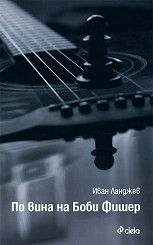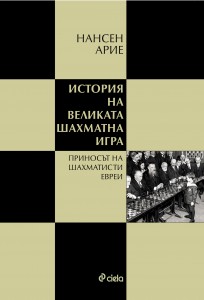A little bit more poetry will be a nice addition to this blog from time to time. And since I am at it to introduce a few internationally not yet very well-known Bulgarian poets here, I am presenting another young contemporary poet today with a few examples of his art.
Ivan Landzhev (born 1986) published his first collection of poetry Blame It on Bobby Fischer (По вина на Боби Фишер) in 2012. The volume was critically acclaimed in Bulgaria and shows an already very versatile and surprisingly mature poet.
The collection that is named (like one of the poems) after the eccentric American chess genius consists like a chess game of three sections: Debut, Mittelspiel, Endspiel, all three are introduced by a quote of Fischer. But of course this threepartition may also stand for the different sections of life, and thus it is not surprising that the author starts his book with a childhood reminiscence:
НЕ ПРЕДИ ТОВА, КОЕТО СЕ СЛУЧИ
на шест години в
двора на къщата
съм си намерил камъки целеустремено удрям
по медалите на майка ми
от първенствата за девойкиняколко трибагреника са раздрани
от родителските постижения
хвърчат искрине, не съм бунтар
златотърсач съм
аз просто извличамславното минало
Not Before What Happened
six years old
in the backyard
I found myself a rockand with it purposefully
I smashed my mother’s medals
from all her youth championshipsa few national flags were torn to pieces
sparks were flying from the parental
achievementsno, I’m not a rebel
I am a gold-digger
I’m just extractingthe glorious past
The chess metaphor plays a role in several of the poems of this book, but it always points at something beyond the experiences on the 64 squares:
Цитирани автори
Треньорът ми по шахмат
казваше:
„Играй си твоята игра.”Треньорът ми по бокс
обичаше да казва:
„Лев–лев–десен–ъперкът,
и оня на земята!”Професорът ми по медиевистика
напомняше, че
„Аз съм Oня, Който съм”.И тримата са прави
по различно време на деня.
Authors Cited
My chess teacher
used to tell me:
‘Play your own game.’My boxing coach
would always say:
‘Left-left-right-then uppercut
and he’s down!’My professor of Medieval studies
reminded me that
‘I am He who is.’All three of them are right
at a different time of the day.
One of my favorite pieces in the book is the following:
Защото ми се струва важно
Силният човек закусва всяка
сутрин по едно и също време,
през прозореца поглежда птиците
и всички му се виждат като дивеч.
Ако се случи да чете, то
силният човек прочита
Хайдегер
и никога Новалис. Нищо
романтично в него няма.
Ето:
същата жена му се обажда всяка вечер
да отиде в бар, където тя е седнала и
се любува най-умишлено на
рамото на друг силен човек,
но силният човек така и не разбира.
Разбира се – той просто не отива.
Да. А докато времетраят тези и онези
правила и се коват законите, аз си седя.
(В подпокривното
студио е нощем.)
Аз слагам лед не повече
отколкото ми трябва.
Аз слушам силно музика,
създадена от крехки хора.
Половината от тях са живи,
обаче като се замисля повечето
май не са…
Навън вали, барабани по
капандурите, от капките
градът е изтормозен. Сив екран,
разяждан от смущения в сигнала.
Когато тракът свърши, ти започваш
и звъниш, сигнализираш ми за себе си,
а как ме дразниш само – зная, пак
не аз съм първият ти избор.
Вътре – цялото знание в главата ми,
навън – смущения, докато аз
отново се обличам
и пристигам
пак!
Да видя
теб
и всичко онова,
което силният човек
си е спестил.
Because it seems important to meThe strong man is having breakfast
every morning at the same specific time.
He looks at birds out the window
and all of them he sees as game.
If it so happens that he reads,
the strong man reads
Heidegger
and never Novalis. There’s
nothing romantic about him.
Here:
The same woman calls him every night
to go to a bar, where she is sitting and
she is admiring most deliberately
the shoulder of another strong man.
But the strong man never finds out.
Of course – he simply doesn’t go.
Yes. And while these and those rules last,
and the laws are being forged, I just sit there.
(Inside the attic
studio it’s night-time).
I put ice, not more
than I would need.
I listen hard to music,
made by fragile people.
Half of them are still alive,
but when I think about it, most
of them are not…
Outside is raining, it’s drumming against
the skylights, the city is pained by the drops.
A grey screen, cankered by
signal disturbances.
When the track is over, you start
and you call, you signal me about yourself,
and how you just annoy me – I know,
again I’m not your first choice.
Inside – all the knowledge in my head,
outside – disturbances, while I
once more put on my clothes
and I arrive
again!
To see
you
and all that which
the strong man
spared himself.
In the following poem, the poet uses a pun that is difficult to translate in another language. ‘Samomnenie’ (самомнение) can mean self-esteem, but also vanity, conceit in Bulgarian, whereas ‘samo mnenie’ (само мнение) means ‘just an opinion’; play on words is a frequent happening in Landzhev’s poetry and it adds to the pleasure of the reader:
По вина на Боби Фишер
Увереността на маестрото,
който премества леко и
естествено шестнайсетте
си фигури – известна ми е.
Вярно е.
Аз имам самомнение.
Ти имаш само мнение.
Каква грандиозна разлика
в едничък интервал – оттук
до мен.
От Бруклин
до Рейкявик.
Е,
не съм ли го заслужил
при такава дистанция,
господин опонент мой,
вездесъщ ерудите?
Не съм ли го заслужил:
по стъпала като спирала да се изкача
най-горе и да се затворя
в къщата си с формата на топ?
Through Bobby Fischer’s fault
“I want to live the rest of my life in a house built exactly like a rook”
Robert James Fischer
The confidence of the maestro
who moves easily and naturally
his sixteen pieces – I know all about it.
It’s true.
I have a self-opinion.
You have yourself an opinion.
What a grand difference
in a single interval – from here
to me.
From Brooklyn
to Reykjavik.
Well,
haven’t I deserved it
upon such a distance,
mister opponent of mine,
ubiquitous erudite, you?
Haven’t I deserved it:
to climb the spiral stairs
up top and seal myself
inside my rook-shaped house?
Ivan Landzhev: a young, fresh voice from Bulgaria. It will be interesting to follow his future development as an author.
Иван Ланджев: По вина на Боби Фишер (Ivan Landzhev: Blame It on Bobby Fischer), Siela, Sofia 2012
The English translations are by the the poet. The translations Authors Cited and Not Before What Happened were published 2011 in Granta 128. The two other translations were published on Versoteque.com.
© Thomas Hübner and mytwostotinki.com, 2014. Unauthorized use and/or duplication of this material without expressed and written permission from this blog’s author and/or owner is strictly prohibited. Excerpts and links may be used, provided that full and clear credit is given to Thomas Hübner and mytwostotinki.com with appropriate and specific direction to the original content.






 Facebook
Facebook RSS
RSS Twitter
Twitter